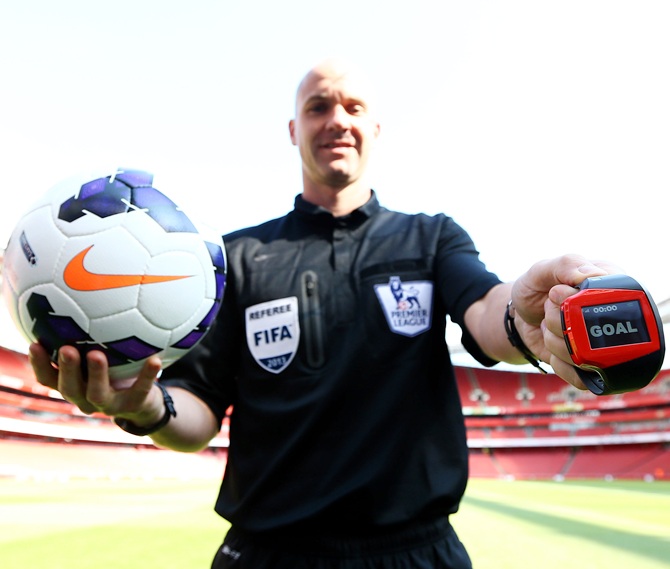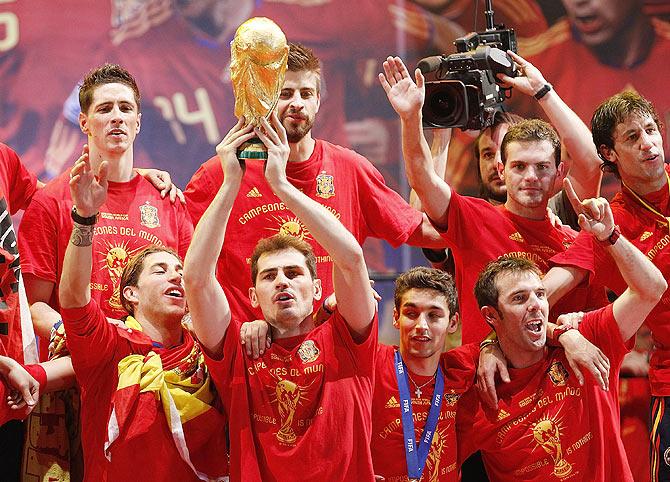 | « Back to article | Print this article |
4 investing lessons from the FIFA World Cup
If you're a first-time investor, there's a lot for you to learn from the ongoing World Cup.
The World Cup fever has gripped everyone.
Even if you are not much of a football fan, there are some interesting parallels one can draw with investing.
Read on and find out how you can be a better investor...
1. Diversify
Each team consists of 11 players -- 10 of which play outfield (offense and defense) and one as the goalkeeper.
The game requires a balancing act between offense and defense and the tilt towards one at any given point will have a strong impact on the outcome.
Your portfolio components must balance each other.
You cannot pack your portfolio only with blue chips -- you need the zing that mid and small caps bring in.
Messi, Ronaldo and Neymar may be the best but they too need a team.
Neither can you only settle for smaller fare -- that would make it too risky.
Your portfolio will also need a fixed income component to balance it out.
Your investment strategy must be heavily tailored to your time horizon and risk profile.
Please click NEXT to continue...
Think global
The 32 nations competing in the World Cup point to the fact that there are numerous investment opportunities across the globe.
All investors have a home bias.
Nothing wrong with that but your portfolio need not be wholly and solely concentrated only in one geography.
The Indian stock market has a lot to offer investors, but investing in stocks of other countries will definitely help.
Last year, investors who had money in US-based funds were extremely happy at the fund performances when the Indian market was struggling and the Indian economy was in the doldrums.
Please click NEXT to continue reading...
Time is of essence
A match will last for 90 minutes and the entire tournament will be over in a month. But it took years of training and planning to bring about this event.
Have a long-time horizon when planning for your retirement.
And accordingly pick investments that will generate wealth and beat inflation.
Every long-term portfolio must have a strong equity component.
Not only is it tax efficient (dividends from stocks are tax free and long-term capital gains on selling equity is nil) but it also beats inflation.
And when you do invest in stocks or equity mutual funds, do some preparation and ground work to ensure that you are packing your portfolio with smart bets and not ad-hoc tips.
Be prepared for 'fat tails'
Remember the 2010 World Cup?
In the final, Spain defeated The Netherlands.
Spain won its first world cup title, the first European nation to win the tournament outside its home continent.
Italy and France were all eliminated in the first round of the tournament.
It was the first time that the host country -- South Africa -- was also sent packing in the first round.
According to Investopedia, a fat tail is a form of portfolio risk that arises when the possibility that an investment will move more than three standard deviations from the mean is greater than what is shown by a normal distribution.
What it means is that a financial fat tail describes a rare and extreme event.
Though the event is very unlikely to occur, on the rare occasion that it does, it can be highly significant.
Think the global financial crisis.
Black Monday was another.
On October 19, 1987, the S&P 500 fell 20 per cent in a single day.
The average move up or down over the past half century was said to be 0.65 per cent.
By that measure, Black Monday was 25 standard deviations away from the mean. Or, who would have thought of Swissair going bankrupt, the Enron fiasco and Lehman Brothers having to be bailed out?
So what is the point?
You can never be sure of any investment.
And how do you counter that?
Have a portfolio strategy, diversify across asset classes and within them too, get an international exposure, and sit in for the long haul.
As Altug Ulkumen, Partner and CIO of Lobnek Wealth Management mentioned in a newsletter after the 2010 games when talking of lessons to be learnt then -- "As in football, the element of surprise can have far reaching consequences on the bottom line. All resources should be used to limiting its impact on a portfolio all the while making sure that it does not become a significant burden on expected returns."
Enjoy the games!




